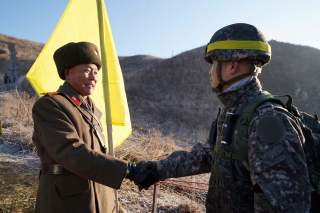North Korea and America’s Second Summit: Here’s What Ken Gause and Chris Steinitz Think Will Happen
"The only way to make progress is to build trust—and leverage along the way."
Editor’s Note: Want more ideas on what will happen at the summit? Check out all 76 expert opinions we gathered here.
Since he came to power, Kim Jong-un has relied on a foundational policy (Byungjin), which promises two objectives: development of North Korea’s nuclear program and the development of the North Korean economy. His legitimacy relies on his ability to deliver on these, but it does not mean that one cannot be valued more than the other. Before launching his diplomatic charm campaign that ultimately brought Trump to the negotiating table, Kim declared a successful end to nuclear testing and made a clear policy shift in favor of economic development—though he did not abandon the production of nuclear weapons. Kim is ready to emphasize the economy over the nuclear program, but the question is if team Trump will allow him to do so, or if they will continue to cling to the pipe dream of full upfront denuclearization.
Trump must realize that he needs to offer some kind of concession to Kim, though it is unclear if he will be willing to make a concession that is valuable enough to his counterpart. It seems increasingly likely that Trump will declare an end to the Korean War. This is undoubtedly a positive step, but it would not deliver the economic benefit that Kim needs. Kim’s key desire is sanctions relief, though it need not be much. In fact, there is a reason to believe that Kim does not want a large economic opening. A dramatic change would be difficult to control and may open his country to sudden social change and vulnerability to foreign (and South Korean) economic exploitation.
Kim Jong-un has to think strategically for his long term survival and that of his family’s regime. He cannot settle for tactical wins for short term gains. He can be patient for the moment, but he has a limited window to solve his own internal challenges. If he cannot achieve sanctions relief through diplomacy, he might return to brinkmanship, which could be a return to the tensions of 2017, or worse. Yet, Kim is not likely to abandon diplomacy as long as there is a window of opportunity for the economic win he needs. If that opening does not come from Washington, he will continue to pursue rapprochement with Seoul for as long as possible. And if that door closes, he will remain beholden to Beijing, which will not allow North Korea to descend into chaos.
It is time to make a fundamental change in U.S. strategy toward North Korea. The focus on denuclearization needs to be replaced with an emphasis on a peace regime. The only way to make progress is to build trust—and leverage along the way. The next summit is an opportunity for Trump to agree to these terms and begin a process based on reciprocity.
Ken Gause is the Director of the Adversary Analytics Program at CNA.
Chris Steinitz is a research scientist at CNA who focuses on adversary analytics and strategic and operational naval issues.
Image: Reuters


